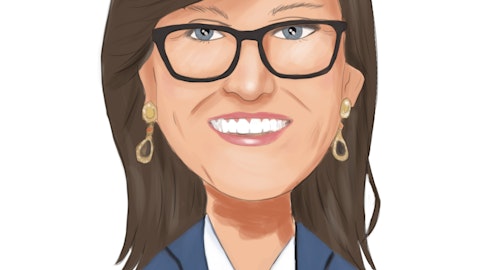Dave Gennarelli: Let’s go to Keith Bachman at BMO.
Keith Bachman: Brett, I wanted to — excuse me, Todd, I wanted to direct this to you, if I could. Just a clarification to start with, you indicated that if you didn’t find a leader of the go-to-market, you would assume that role. But I would assume that’s just a temporary position. In other words, you would keep searching because you’re being stretched in a lot of different directions. So, I just want to clarify that. And then the real question is in terms of the guide, I want to try to understand the competitive dynamics. And what I mean by that is, your CRPO guide for Q4 is 21%. And candidly, you’ve been beating that a little bit, and yet your rev guide for the out year is below that. And so, I’m just trying to understand, as the economy weakens here, is the pipeline remaining robust?
And really, are you seeing any changes in the competitive dynamics? Because I think what the investors have some concern about is as the macro weakens, perhaps that causes some users to migrate towards Microsoft, if the cost is cheaper. So just wanted to understand a little bit on that. Many thanks.
Todd McKinnon: Yes. So specifically on Susan’s retirement and timing, what the plan is, is that she is in her job until the end of January. And so, we will be searching for a replacement, considering internal candidates, external candidates, finding the best person in the world. And if we don’t find anyone by February 1, we’ll keep searching, but I will be the interim until we find someone.
Keith Bachman: Perfect.
Todd McKinnon: And then about the competitive environment, the competitive environment, broadly speaking, has been consistent for several years. I talk about this a lot for the folks that have been around the story for a long time. The market is — it’s kind of decided — the people in the market decided if they want cloud or they want on-prem. And the folks that want on-prem, there’s good on-prem solutions like Ping and ForgeRock and that part of the market is — we think it’s smaller right now. We think it’s trending down over time as more people want a modern solution. And then the other big competitive dynamic is do you want to get it from a monolithic platform? Or do you — that has other apps and services to sell you as well?
Or do you want an independent and neutral — someone to focus on identity. And that’s been the way it’s been for a long time. And our strategy is focused on extending that lead over time. I think the reality is that in a recessionary environment, what you’re saying is likely true. Some people are going to choose, hey, the monolithic platform, the Microsofts. And by the way, we assume that every big cloud is going to have their version of Okta eventually. It’s a very compelling business obviously, and they’re going to want to try to provide some of this value. And that’s why we think independent neutrality is the best strategic opportunity. But yes, in a recessionary environment, I’m sure some will choose to go with the monolithic platform. So that is kind of like negative.
But on the positive side, there are — I gave the example of KeyBanc. This past quarter, they’re consolidating identity vendors because of the same force. And they’re picking the independent neutral leader. And so, that was driving them toward Okta. So, I think in this whole recessionary environment, I don’t expect competitive environment. In certain cases, it might shift one way or the other. But in aggregate, I think it’s going to be as consistent as it’s been in the last four, five years.





